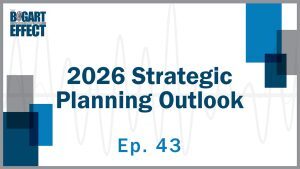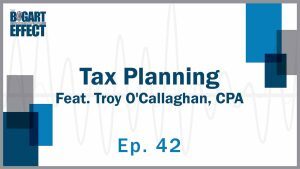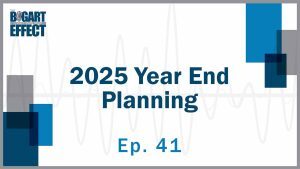Political headlines create anxiety. Your portfolio deserves better than emotional reactions. In this episode, learn why disciplined investing outperforms political predictions every time.
In this episode of THE BOGART EFFECT, James Bogart, CFP®, CHFC®, and Patrick Marcinko, CFP®, break down the real relationship between politics and your investments—and why staying the course matters more than election outcomes.
Episode Highlights
- 00:00 – Introduction: Why politics and investing create emotional conflict
- 03:15 – The Political Bias Trap: How your political identity distorts financial decisions
- 08:42 – Real Market Movers: President, Congress, and the Federal Reserve’s actual influence
- 15:20 – The Data Speaks: Historical market performance across administrations
- 22:10 – Policy Noise vs. Reality: Why campaign promises rarely become implemented policy
- 28:35 – Building Your Strategy: The bucket approach and tax diversification
- 35:50 – The Advisor’s Role: Why objective guidance matters during uncertainty
- 42:00 – Final Takeaways: Actionable steps to stay invested through political cycles
Key Takeaways from This Episode
Elections Don’t Predict Returns
Research from Vanguard analyzing 160+ years of market data reveals no statistical correlation between which party wins elections and long-term portfolio performance. Markets efficiently price in political developments, making election-based timing strategies ineffective.
Your Political Bias Costs You Money
Surveys consistently show Democrats feel optimistic about the economy under Democratic presidents, while Republicans express confidence during Republican administrations—regardless of actual economic data. This emotional investing behavior leads investors to buy high (when their candidate wins) and sell low (when their candidate loses), destroying wealth over time.
The Federal Reserve Matters More Than the President
Interest rate decisions, money supply adjustments, and Fed policy commentary affect market performance more consistently than presidential actions. Analysis from the Federal Reserve Bank of St. Louis shows market volatility typically declines after elections regardless of which party wins—because uncertainty resolves, not because of who won.
Missing the Best Days Destroys Long-Term Returns
The market’s strongest performance days often occur during periods of maximum political uncertainty. Investors who moved to cash “until things settle down” miss these critical days. Missing just the 10 best market days over a 30-year period can reduce total returns by more than 50 percent.
Strategies Discussed in the Podcast
The Bucket Approach for Managing Uncertainty
Our advisors explain how organizing assets by time horizon creates emotional stability during market volatility:
- Short-Term Bucket (0-2 years): Cash and equivalents covering immediate needs. Knowing these expenses are protected reduces panic during market declines.
- Intermediate Bucket (3-10 years): Balanced allocation between growth and stability. This bucket bridges near-term security with long-term growth.
- Long-Term Bucket (10+ years): Growth-oriented equity investments. Time horizon allows riding out political cycles and market volatility.
Tax Diversification Across Political Scenarios
Holding investments across multiple account types—taxable, traditional retirement, and Roth accounts—provides flexibility regardless of future tax policy changes. No matter which party controls Congress, you maintain tax-efficient withdrawal options.
The Role of Professional Guidance
James and Patrick emphasize how financial planning professionals serve as objective third parties who filter political noise from genuine investment signals. This quarterback function prevents costly emotional reactions during election cycles.
Who Should Watch This Episode
This conversation provides value if you:
- Feel anxious about how political developments might affect your portfolio
- Have considered moving investments to cash until “things settle down”
- Wonder whether election outcomes should influence your investment strategy
- Want to understand the real factors driving long-term market performance
- Are approaching retirement and concerned about political risk
- Need strategies for maintaining discipline during media-driven fear cycles
Resources Mentioned
- Vanguard Research: Presidential Elections and Investment Performance: Comprehensive analysis of 160+ years of market data (1860-present) showing no statistical correlation between presidential party control and 60/40 portfolio performance. Includes volatility data demonstrating that markets actually experience lower volatility during election periods than historical averages.
- Federal Reserve Bank of St. Louis: Election Day Volatility Analysis: Data-driven research examining VIX (volatility index) patterns around presidential elections from 1988-2024. Shows that expected market volatility typically declines after elections regardless of which party wins, as uncertainty resolves.
- U.S. Bank: Behavioral Finance and Investment Biases: Educational resource explaining how cognitive biases—including confirmation bias, loss aversion, and groupthink—affect investment decisions. Features insights from Daniel Kahneman and Amos Tversky’s groundbreaking research on behavioral economics.
- Morningstar: The Bucket Approach to Retirement Portfolio Management: Detailed guide to implementing the bucket strategy discussed in the podcast. Written by Christine Benz, Morningstar’s Director of Personal Finance, this resource explains how to structure retirement assets across short-term, intermediate, and long-term buckets to manage sequence-of-returns risk.
- Charles Schwab: Bucket Drawdown Strategy Implementation: Practical framework for organizing retirement assets by time horizon. Explains how the bucket approach provides psychological benefits during market volatility by separating near-term needs from long-term growth assets.
- Modern Portfolio Theory: Diversification principles discussed in the episode for managing risk across different political scenarios. This academic framework, developed by Harry Markowitz, demonstrates how combining assets with different risk profiles can optimize returns while reducing overall portfolio volatility.
Continue the Conversation
Questions after watching? Our team regularly addresses client concerns about political risk and portfolio management. Schedule a conversation with one of our advisors to discuss how these principles apply to your specific situation.
Explore related topics: Learn more about common investor behaviors that impact returns, or read our insights on navigating market volatility with confidence.
FAQs About Politics and Wealth
Should I adjust my portfolio based on election results?
Historical data strongly suggests no. Markets have generated positive long-term returns under both Democratic and Republican administrations. The S&P 500’s performance shows no consistent pattern based on which party controls the White House or Congress. Your portfolio adjustments should reflect changes in your personal circumstances—time horizon, risk tolerance, cash needs—not political outcomes.
Why does market volatility spike before elections?
Uncertainty about future policy direction creates short-term volatility increases. However, this volatility typically subsides within days or weeks after election results become clear, regardless of who wins. The volatility represents markets processing uncertainty, not a fundamental change in long-term prospects. Importantly, some of the market’s strongest performance days occur during these volatile periods, making it costly to sit on the sidelines.
How can I stay invested when political news makes me anxious?
The bucket approach discussed in the podcast helps significantly. Knowing you have 24+ months of expenses in stable, liquid investments provides emotional security during volatility. This structure prevents you from needing to sell growth assets during temporary market declines caused by political uncertainty. Additionally, working with a financial advisor provides objective perspective when headlines overwhelm your judgment.
What if the candidate I oppose wins—shouldn’t I protect my portfolio?
This thinking has consistently cost investors substantial returns. When your preferred candidate loses, your brain overestimates negative economic impacts. When your candidate wins, you overestimate positive impacts. Neither assessment typically proves accurate. The data shows markets generate wealth for patient investors regardless of political outcomes. Protecting your portfolio means maintaining diversification and discipline, not reacting to election results.
About the Hosts
- James Bogart, CFP®, CHFC® founded Bogart Wealth with a vision of providing comprehensive, objective financial guidance. His approach emphasizes evidence-based strategies that transcend political cycles and media noise.
- Patrick Marcinko, CFP® brings extensive experience helping clients navigate uncertainty with confidence. His expertise in behavioral finance helps investors recognize when emotions might be driving decisions rather than sound financial reasoning.
Ready to Build a Strategy That Transcends Political Cycles?
Our team specializes in creating comprehensive financial plans designed to weather uncertainty. We help you maintain focus on long-term goals regardless of political developments. Schedule Your Consultation



